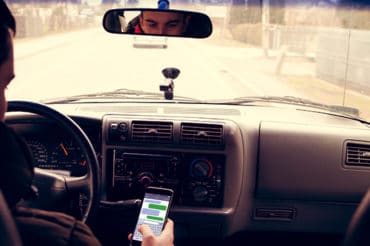

Risky Business
There are different ways to be distracted while on the road. Talking to your kids, looking at a billboard or even picking up that bottle of water.
Forms of Distracted Driving Include:
- Visual – taking your eyes off of the road
- Cognitive/Mental – not focusing on the road
- Manual – taking your hands off of the wheel
When texting while operating a motor vehicle, you’re actually combining all three distractions. Thus, creating an unsafe environment not only for you and possibly your passengers, but also for the other drivers on the road.
Most violators admit to knowing that it’s dangerous, but do it despite the risks involved. The Virginia Tech Transportation Institute has shown that the risk of a crash is 23 times higher if an individual is texting, due greatly in part to the fact that their eyes are taken off of the road for an average of 5 seconds.
Rising Fatalities
According to the National Highway Traffic Safety Administration, 3,092 people were killed in automobile accidents resulting from distracted driving in 2010, which was the cause if 18% of all fatal crashes.
With the steady increase of casualties from texting while driving, new laws banning not only texting but also the use of a cellphones while at the wheel have been put into action. Currently, 10 states prohibit all drivers from using a cellphone while operating a motor vehicle, while 39 states ban all drivers from text messaging while behind the wheel.
Taking Action
With the advancement of technology and the development of newer mobile devices, lawmakers have not only brought about new laws banning texting and cellphone use while driving, but have also partnered with other well-known organizations to create campaigns to bring about public awareness of the risks.
Many cellphone companies have begun campaigns to “Take The Pledge” against texting and driving in hopes that education will bring about change. Even government agencies, such as the U.S. Department of Transportation, have partnered with other organizations to create online campaigns to educate the nation.
Not Worth Your Life
We all know that texting and driving is dangerous, so the next time you find yourself behind the wheel and beginning to reach for that cellphone, just remember that your safety comes first. Your next text message is not worth your life or the life of someone else on the road.



